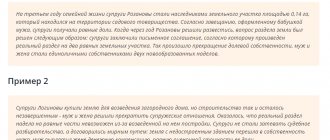Home / Real estate / Land / Purchase and sale
Back
Published: 12/15/2016
Reading time: 12 min
0
1486
Among participants in the real estate market, purchase and sale agreements for shares of land plots are periodically concluded; such transactions are necessary for various reasons.
Drawing up agreements on the transfer of ownership of shares of land from one person to another through commercial sale is not very different from ordinary agreements on the purchase of plots of land, but has a number of features that depend on the category of land and the motives for such a transaction. How to buy part of a land plot?
- General rules for purchasing a share of land
- Reasons for purchasing a share of land
- Algorithm for purchasing a share of a plot of land
- Drawing up a preliminary purchase and sale agreement
- Main
General rules for purchasing a share of land
If one plot of land has two or more owners, while this plot has one cadastral number and is not delimited internally, then the owners are said to own this plot as shared ownership. An example of such owners would be spouses who acquired a plot of land during marriage.
Thus, they can enter into a transaction for the purchase and sale of a land plot in shared ownership with any person, if the second party (the owner of the share) does not exercise the right of first refusal. If the owner of a share of a plot of land wants to register this share as a separate plot of land, with a separate cadastral number and its own boundaries, then this procedure is called allocating a share to a plot.
Reasons for purchasing a share of land
Prerequisites for purchasing shares of land arise from owners (both legal entities and individuals) of different categories of land. The main reasons for purchasing a share of land real estate are:
- The need to allocate a share in a separate plot of land, the area of which is too small;
- Purchasing a house located on a plot of land of a significant area in comparison with the area of land that the house occupies;
- The need to buy out the share of the owner leaving the peasant farm (peasant farm);
- The intention is to combine several shares to separate them into one plot.
To allocate a share into an independent plot of land, the area of this share must correspond to certain values determined for each region.
If the size of the share is too small for such an allocation, then the issue can be resolved by purchasing a share from neighbors and merging these shares into one.
If the owner of a plot wants to sell a house on this plot, then the land, according to Art. 35 of the Land Code of the Russian Federation, passes to the buyer of the house. A seller may sell a share of his lot with a house if the entire lot is much larger than the area required for the occupied home.
If a co-owner of a peasant farm wants to leave it, then the remaining participants have a special priority right to buy from the person leaving his share in the land plot occupied by this peasant farm.
Algorithm for purchasing a share of a plot of land
If the share being sold belongs to the category of land in settlements, or to the category of agricultural land of the subcategories of gardening, summer cottage construction or personal subsidiary plots, then the procedure for purchasing such a share is similar to the procedure for purchasing a land plot with some differences.
For shares from the above categories of land, the procedure is as follows:
- Verification of all documents of the alienated share of the land plot (ownership rights, cadastral passport, extract from the Unified State Register of Encumbrances).
- The parties to the transaction draw up a preliminary agreement for the purchase and sale of a share in the land plot, which specifies the general terms of the transaction.
- It is necessary to ensure that the seller informs other owners of the land plot from which the share is being alienated about its upcoming sale.
- Upon the reluctance of other owners of the plot to purchase the seller’s share and the completion of verification of all documents, the main purchase agreement is drawn up and signed.
- The contract (agreement) is registered with the Rosreestr authorities, where the buyer is issued a document of ownership.
It must be taken into account that the pre-emptive right to purchase a share of a plot of land is the owners of other shares of this plot, according to Art. 250 part 1 of the Civil Code of the Russian Federation.
The seller must first notify in writing the co-owners of the land plot of his desire to sell the share belonging to him, indicating the price of the share and other conditions, and if within thirty calendar days the co-owners of the plot do not express their intention to buy such a share, then the seller has the right to sell it to third parties.
To sell a share of land, the seller will need the consent of the general meeting of owners of shares of the land plot, if the purchased share belongs to the subcategory:
- peasant farms;
- arable land;
- land for grazing;
- land for haymaking.
Without such consent, the transaction may be declared void by a court decision. The general meeting of owners is organized by the chairman of the collective of allotment owners at the request of the seller. In order for the seller to obtain permission to sell his share, the consent of a simple majority of the assembled owners ( 50% + one vote ) is required. A quorum requires the presence of 20% of all owners at the meeting.
The minutes of the meeting must be attached to the transaction agreement; other actions to acquire a share are taken in accordance with the above algorithm.
The Civil Code of the Russian Federation provides for two types of common property (owned by several persons) - shared and joint. Shared ownership involves dividing property between owners into shares. Common ownership of property is shared, except for cases where the law provides for the formation of joint ownership of this property (clause 3 of Article 244 of the Civil Code of the Russian Federation).
The rules of the Civil Code of the Russian Federation on shared ownership also apply to shared ownership of land plots. Special rules are provided for by land legislation. It is necessary to take into account that when considering issues of shared ownership, the so-called ideal shares are taken into account - the right is divided, not the land plot. If the owners need to determine who owns specific parts of the land plot, they should make a division or allocation of the plot (Articles 11.4, 11.5 of the Land Code of the Russian Federation, Article 252 of the Civil Code of the Russian Federation). If the allocation of a share is impossible, the owners can determine the procedure for using the property (Article 247 of the Civil Code of the Russian Federation). Common ownership of a land plot arises in the following cases: - two or more persons acquire property that cannot be divided without changing its purpose (indivisible things) or is not subject to division by force of law. For example, when inheriting an indivisible land plot by several heirs; acquisition of ownership of one plot of land by several persons who are not spouses or participants in a peasant (farm) enterprise; upon sale (donation) by the sole owner of a share in a land plot belonging to him; - by agreement of the parties, shares in common joint property are determined (for example, when spouses enter into a marriage contract) - clause 5 of Art. 244 Civil Code of the Russian Federation; - division of property in common joint ownership occurs by court decision (for example, when dividing jointly acquired property of spouses, allocating a share in the right of common property) - clause 5 of Art. 244 Civil Code of the Russian Federation. The determination of shares in the right of common shared ownership of a land plot is carried out in accordance with the general procedure established by Art. 245 of the Civil Code of the Russian Federation. If the shares of participants in shared ownership cannot be determined on the basis of law and are not established by agreement of all its participants, the shares are considered equal (clause 1 of Article 245 of the Civil Code of the Russian Federation). The law provides for cases when the size of the owners' shares can be changed. In the process of owning and using a land plot, it (like any other property) can be transformed and improved through the contributions of co-owners. Clause 2 of Art. 245 of the Civil Code of the Russian Federation provides that by agreement of all participants in shared ownership, a procedure for determining and changing their shares can be established depending on the contribution of each of them to the formation and growth of common property. It is also necessary to take into account that a participant in shared ownership, who has carried out inseparable improvements to this property at his own expense in compliance with the established procedure for the use of common property, has the right to a corresponding increase in his share in the right to common property (clause 3 of Article 245 of the Civil Code of the Russian Federation). In relation to separable improvements, the rule applies that they become the property of the participant who made these improvements. Possession, use and disposal of land plots in shared ownership are regulated by the general provisions of the Civil Code of the Russian Federation on shared ownership (Articles 246, 247 of the Civil Code of the Russian Federation). Possession and use of property is carried out by agreement of all participants in shared ownership, and if agreement is not reached, in the manner established by the court. Each participant in shared ownership has the right to own and use part of the common property on an equal basis with the other participants in shared ownership. The part of the property provided for use must be proportional to the share owned by the owner. If this is not possible, he has the right to demand compensation. If there is real estate on the land plot, it is necessary to take into account the rights of the owner of the said property (regardless of whether he is the owner of one of the shares of the land plot). The owner of real estate located on someone else's land plot has the right (clauses 1, 3 of Article 271 of the Civil Code of the Russian Federation): - to use the land plot; - own, use and dispose of real estate belonging to him at his own discretion (including demolishing relevant buildings and structures). The disposal of property in shared ownership is also carried out by agreement of the owners. The law grants the right to a participant in common property to dispose of his share at his own discretion (sell, donate, bequeath, pledge, etc.). If alienation for compensation is expected, it is necessary to comply with the rules of Art. 250 of the Civil Code of the Russian Federation on the pre-emptive right to purchase. Land legislation also contains special rules related to the disposal of land plots. Thus, an additional basis is provided for applying the rule of pre-emption in the event that there are buildings on the land plot. The owner of a building or structure has a pre-emptive right to purchase or lease a land plot by analogy with the procedure established by civil law for cases of sale of a share in the right of common ownership to an outsider (Clause 3 of Article 35 of the Land Code of the Russian Federation). When disposing of a land plot, peculiarities may arise related to the subject composition of the owners. For example, foreign citizens, stateless persons and foreign legal entities cannot have ownership of land plots located in border territories and other special territories (Clause 3 of Article 15 of the Land Code of the Russian Federation). Therefore, it is impossible to sell (or otherwise transfer) a share of such land to them. Agricultural lands have a special status (they do not include garden and vegetable plots located on agricultural lands, land plots intended for personal farming, garage construction (including individual garage construction), as well as land plots on which real estate objects are located) – clause 1 of Art. 1 of Federal Law No. 101-FZ of July 24, 2002 “On the turnover of agricultural land”, hereinafter referred to as Law No. 101-FZ). Possession, use and disposal of a land plot of agricultural land, which is in shared ownership of more than five persons, is carried out in accordance with the decision of the participants in shared ownership, which is adopted at the general meeting of participants in shared ownership (Article 14 of Law No. 101-FZ). Certain restrictions are imposed on a participant in shared ownership of a land plot from the category of agricultural land. He may, at his own discretion, without allocating a share: - bequeath a share; - renounce ownership of the land share; — contribute it to the authorized (share) capital of the agricultural organization that uses this land plot; — transfer your land share into trust management or sell or donate it to another participant in shared ownership; - transfer your land share into trust management, or sell or donate it to an agricultural organization or citizen - a member of a peasant (farm) enterprise that uses this land plot. If the owner wants to dispose of the share in a different way (for example, sell it to a third party), he must first allocate the share belonging to him (Article 12 of Law No. 101-FZ).
Drawing up a purchase and sale agreement
When drawing up a real estate purchase agreement, you need to take into account many nuances. The buyer and seller want to be sure that the terms of the contract will be based on the terms orally agreed upon by the parties in advance. Since there can be quite a lot of such conditions, it is sometimes convenient to draw up a preliminary agreement for the purchase of real estate (share of land).
Preliminary
In real estate transactions, the preliminary agreement is not subject to registration with the Rosreestr authorities. The preliminary agreement form must contain the following points:
- Information about the land share being sold, the address of this share, land use category;
- Area, cadastral number and details of the registration certificate of the share being sold;
- Essential points of the future contract that are important for both parties;
- Fixed date for concluding a contract or starting condition;
- Information about the possible payment by the buyer of a deposit or advance payment.
A sample preliminary contract for the purchase and sale of a land plot can be downloaded here.
It is necessary to remember the difference between a deposit (deposit) and an advance payment. In case of refusal to conclude an agreement by any of its parties, the advance payment must be returned to the buyer, while the deposit is either not returned at all or partially returned (if the buyer refused the transaction), or is returned in double or other multiple amounts (if the seller refused the transaction).
The amount of such collateral and the exact conditions for its return are determined by the parties.
Main
There are standard forms for contracts for the sale of plots of land. To draw up an agreement for the sale of a share, the parties can use a ready-made form, making the necessary changes to it, or contact professional lawyers for help. The contract must contain the following clauses:
- Full names and passport details of the parties involved in the transaction;
- Description of the subject of the agreement - the share of land being sold;
- Description of possible encumbrances on the share being sold;
- Transaction price in rubles;
- Payment methods and terms;
- Details of the parties to the transaction;
- Other conditions.
A sample contract for the sale and purchase of a share of land can be downloaded here.
In the description of the subject of the agreement, it is necessary to enter all the characteristics of the share being sold (cadastral number, area, etc.). If there are encumbrances on the share (for example, tax debt), then they pass to the new owner.
Payment methods can be cash, bank transfer or safe deposit box. The last method is the most reliable.
The contract must also contain information about the responsibility of the parties to the transaction for violation of the clauses of the contract and about possible unforeseen circumstances that objectively prevent the parties from fulfilling certain clauses of the contract.
Sublease of a land plot is fundamentally different from assignment. Do you want to privatize a dorm room? Find out how to do this by reading our article. What is a housing certificate and how to use it correctly? Find out about this in our article.
Simplification of registration of transactions with common property
From July 31, 2021, the procedure for registering certain transactions with shares in common ownership has been changed.
In accordance with the wording of the Federal Law of July 13, 2015 No. 218-FZ “On State Registration of Real Estate” (hereinafter referred to as Law No. 218-FZ), which was in force until July 31, 2019, alienation transactions or mortgage agreements of shares in the right common ownership of real estate, including the alienation or mortgage by all participants in shared ownership of their shares in one transaction, were subject to notarization, with the exception of transactions related to property constituting a mutual investment fund or acquired for inclusion in the mutual investment fund, transactions on the alienation of land shares, transactions for the alienation and acquisition of shares in the right of common ownership of real estate when concluding an agreement providing for the transfer of ownership of residential premises in accordance with the Law of the Russian Federation of April 15, 1993 No. 4802-1 “On the status of the capital of the Russian Federation” (except for the case provided for in Part 19 of Article 7.3 of Law No. 218-FZ).
That is, until July 31, 2021, the participation of notaries was mandatory when concluding mortgage agreements for the purchase of shares in an apartment or house. The mandatory procedure for notarization of transactions, introduced in 2021, was intended to protect participants in real estate transactions (eliminate the possibility of sham transactions).
In practice, the participation of a notary, as a rule, complicated the process and hit the pocket financially. The cost of notary services depends on the value of the purchased share.
For example, according to Art. 22.1 “Fundamentals of the legislation of the Russian Federation on notaries” (approved by the Supreme Court of the Russian Federation on February 11, 1993, No. 4462-1) for certification of transactions the subject of which is the alienation of real estate:
- spouse, parents, children, grandchildren depending on the transaction amount:
- up to 10 million rubles inclusive - 3,000 rubles plus 0.2% of the valuation of real estate (transaction amount);
- over 10 million rubles - 23,000 rubles plus 0.1% of the transaction amount exceeding 10 million rubles, but not more than 50,000 rubles;
- to other persons depending on the transaction amount:
up to 1 million rubles inclusive - 3,000 rubles plus 0.4% of the transaction amount;
- over 1 million rubles up to 10 million rubles inclusive - 7,000 rubles plus 0.2 percent of the transaction amount exceeding 1 million rubles;
- over 10 million rubles - 25,000 rubles plus 0.1% of the transaction amount exceeding 10 million rubles, and in case of alienation of residential premises (apartments, rooms, residential buildings) and land plots occupied by residential buildings - no more than 100 thousand rubles .
On May 1, 2021, the President of the Russian Federation signed Federal Law No. 76-FZ “On amendments to certain legislative acts of the Russian Federation regarding the specifics of changing the terms of a credit agreement, a loan agreement, which were concluded with a borrower - an individual for purposes not related to his business activities , and the borrower’s obligations for which are secured by a mortgage, at the borrower’s request” (hereinafter referred to as Law No. 76-FZ), which amends Art. 42 of Federal Law 218-FZ “On State Registration of Real Estate”.
The introduction of Law No. 76-FZ itself is, first of all, aimed at easing the plight of citizens on mortgage housing loans in the event of a difficult life situation (mortgage holidays) against the backdrop of the continuing decline in the standard of living of Russian citizens (despite the favorable assessment of Rosstat of the Russian Federation). In addition, thanks to Law No. 76-FZ, the procedure for completing individual transactions with shares in common property rights will be simplified.
Important!
Starting from July 31, 2021, when making certain transactions with shares in the right of common ownership, notarization is not required.
Now there is no need to carry out notarization of transactions in the case of alienation or mortgage by all participants in shared ownership of their shares in one transaction, agreements on the mortgage of shares in the right of common ownership of real estate, concluded with credit institutions (for example, banks).
Let us recall that with shared ownership, real estate belongs to several individuals, the size of each owner’s share is determined. And with joint ownership, the property belongs to several individuals without determining the shares of each.
That is, contracts for the sale and purchase, gift, inheritance or mortgage of shares can be concluded in simple written form if signed by all share owners of the property. At the same time, citizens have the right to choose whether or not it is necessary to notarize a transaction with shares, because often close relatives become co-owners of real estate (apartment, house, garage, land plot).
Important!
In the event of alienation of shares without notarization, the participants in the transaction must contact Rosreestr or the MFC and register the transfer of ownership by submitting a certain set of documents.
But in cases where transactions for the sale of a share of real estate are formalized by different agreements, notarization is required.
Notarization is still required if the property is not alienated by all owners at the same time.
If, for example, rooms in communal apartments belong to their owners in the form of shares in the right of common shared ownership of the entire apartment, then in these cases it is still necessary to notarize the transaction.










